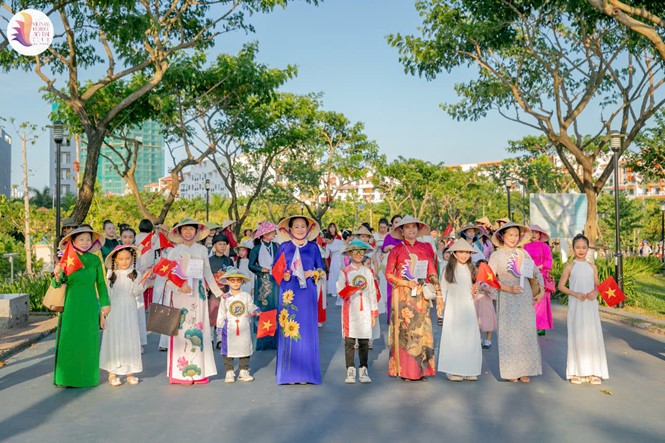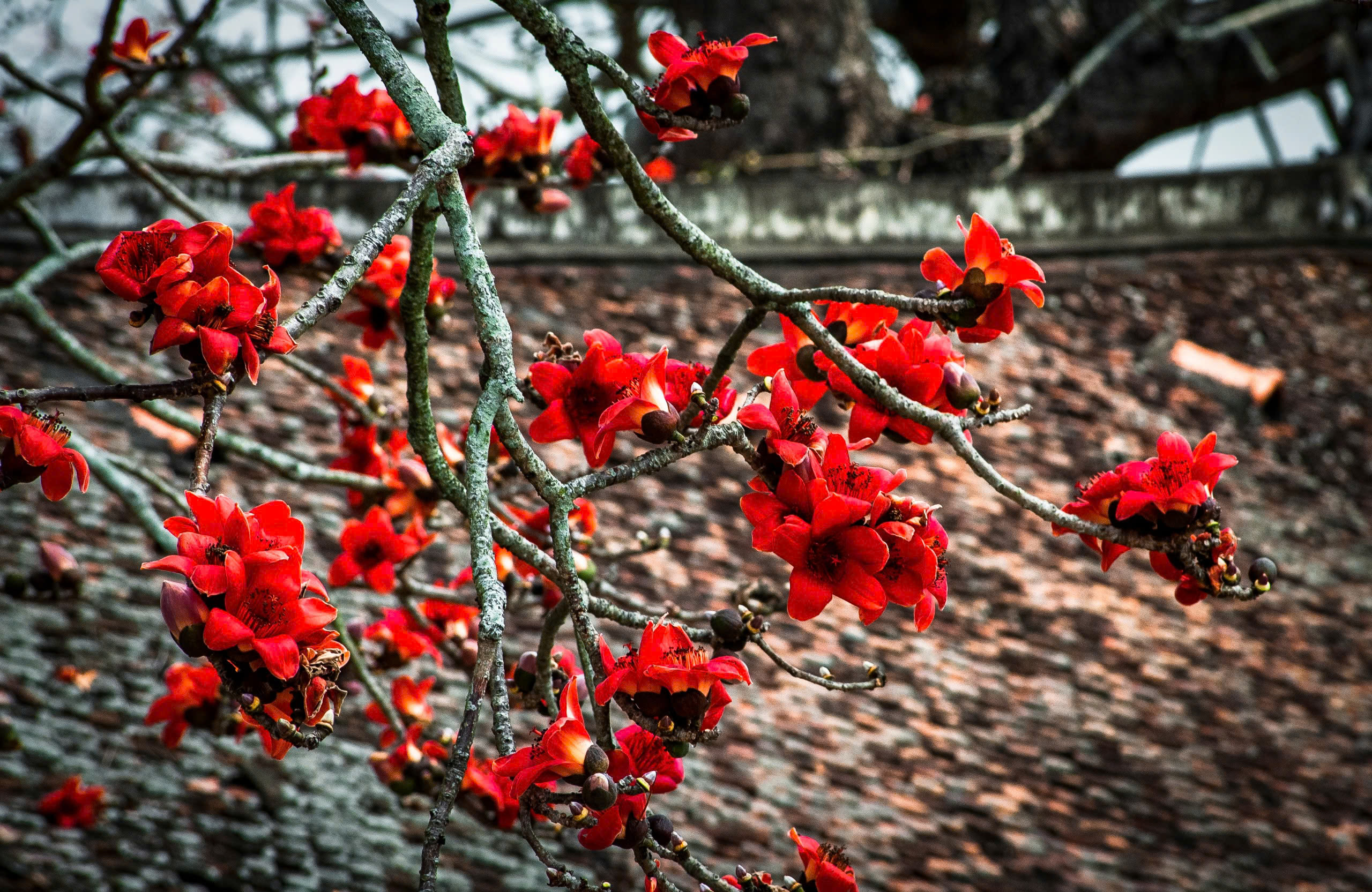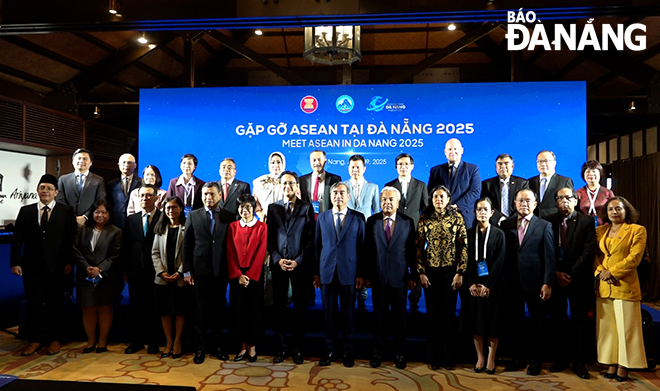Building cultural bridges through gaming and fashion
Software and games, along with fashion, are two of the 12 cultural industries in Vietnam. These industries also include advertising, architecture, handicrafts, design, cinema, publishing, performing arts, fine arts, photography and exhibitions, television and radio, and cultural tourism. In Da Nang, software and fashion are two fields that require tailored development strategies to fully unlock their potential.
 |
| The Vietnamese Ao Dai Heritage Club in Da Nang showcases ao dai performances on the streets. Photo: PV |
Fashion narrates cultural stories
A meeting in Hanoi toward the end of 2024 brought the leader of the Vietnamese Ao Dai Heritage Club in Da Nang to encounter a remarkable figure—former Vice President Nguyen Thi Binh. In a warm and intimate atmosphere, the illustrious 97-year-old politician presented the women from the Han River city with a priceless artifact: the ao dai she wore during the historic Paris Peace Talks (1969-1973), adorned with her signature.
The historic ao dai is being carefully preserved by Nguyen Thi Van Lan, former Deputy Head of National Assembly Delegation from Da Nang and Honorary President of the Club, along with Le Thi Ly, Deputy Director of Hung Vuong Cultural Research and Development Center and President of the Club.
This iconic ao dai from former Vice President Nguyen Thi Binh will become a significant artifact in the Club's "Heritage House" dedicated to the ao dai. Within its exhibition space, the Club aims to showcase the evolution of the ao dai through various historical periods, highlighting Vietnam’s cultural identity, much like how South Korea promotes the Hanbok or Japan celebrates the Kimono. This venue will also serve as a destination where visitors can experience the elegance of Vietnamese ao dai, capture beautiful photos, and help propagate the image of this cultural symbol.
With a heartfelt commitment to preserving the traditional values of ao dai as a cultural bridge, members of the Club have actively participated in numerous cultural festivals and tourism events in Da Nang and neighboring areas. Their efforts include gifting ao dai to students and organizing ao dai performances. "In the vibrant and dynamic rhythm of modern life in Da Nang, the Club was established to connect and spread love for ao dai—a garment rich in Vietnamese identity," shared Ms. Ly.
| According to the city's Tourism Promotion Center, culturally distinctive fashion, particularly the ao dai and other traditional attire, is showcased to visitors through cultural-tourism products such as Ao Dai Show (by VKSTAR JSC), Soul of Vietnam (Nguyen Hien Dinh Tuong Theater), and Heritage Road (a collaboration between AHT Company and Da Nang College of Culture and Arts). |
The iconic ao dai has also been brought to the public's attention through striking collections by designer Le Doan Hung, the founder of Tam Design. Last year, his collection Ha Y debuted at My Tuc Kha Gia program held in the traditional setting of Lo Giang communal house (Hoa Xuan Ward, Cam Le District). With a performance by Truong Dieu Ngoc, Miss Ao Dai Vietnam 2016, Tran Nguyen Minh Thu, third runner-up of Miss Grand Vietnam 2022, and other models, the vibrant imagery of Vietnamese ao dai was brought to life. Recently, Mr. Hung launched his Mo Mang collection in Hoi An ancient town (Quang Nam Province), which is features in a delicate style. Most of the designs were created in the form of traditional ao dai with halter tops, adorned with intricate embellishments that both honor the cultural value of the ao dai and reflect innovative creativity.
Da Nang holds significant potential for fashion development when it is a thriving tourist city. Moreover, the city benefits from a young talent pool for the fashion design industry, with Duy Tan University leading as the first institution offering specialized training. "From a personal perspective, I hope the city will create more platforms for designers and facilitate the organization of more fashion shows. These opportunities will help advance the fashion industry here," shared Mr. Hung.
Sharing a similar perspective, Truong Mi Sa, founder of Xom Thu Cong—a traditional crafts project involving many young people in Da Nang and Hoi An—emphasized the importance of developing fashion that both honors cultural heritage and promotes tourism. Currently working on the Hoi Co Viet Phuc project, which recreates traditional Vietnamese attire, she remarked, "Fashion enterprises in Da Nang and Hoi An have a natural advantage as they can connect with a steady stream of customers. Visitors can enjoy sightseeing while also attending fashion showcases. However, compared to Hanoi and Ho Chi Minh City, we lack large-scale platforms like International Fashion Week where fashion professionals can gain valuable experience."
| "In the field of technology and entertainment, there is a need to focus on developing games that strongly reflect Vietnamese identity; creating platforms/ ecosystems for distributing licensed digital content, and applying AR/VR technology in cultural experiences."
Mr. Bui Nguyen Hung, Chairman of the Vietnam Creative and Copyright Association. |
Developing games with Vietnamese cultural themes
Mr. Nguyen Song Bao Khiem, Deputy Director of Duy Hai Technology Co., Ltd., shares his perspective on creating fully Vietnamese games in Da Nang. Compared to Hanoi and Ho Chi Minh City, Da Nang is a smaller city in the gaming industry. The number of game studios here is still limited, and the pool of highly skilled talent cannot yet compete with those in the two larger cities. However, this presents an opportunity to cultivate a generation of highly skilled game developers.
Regarding the human resource issue, M.A. Vu Thu Thanh Huyen, Head of the Information Technology Department at FPT Polytechnic College Da Nang, believes that the growth of the information technology sector, along with a young workforce and low labor costs, creates favorable conditions for Da Nang to strengthen its gaming industry. Additionally, the living and working environment here is ideal for companies seeking long-term investments.
Currently, FPT Polytechnic College Da Nang offers a specialized program in game programming. Students focus on mastering core programming techniques, followed by graphic design, image processing, and game storyline/script development. The goal is to prepare students to become game programmers, game designers, game testers, graphic designers, or game project managers upon graduation.
According to M.A. Vu Thu Thanh Huyen, after each course, students will work on a major project to apply the knowledge they have learned. In particular, students are encouraged to participate in game competitions that focus on creative topics related to Vietnamese culture. One such competition is the Game Viet Hackathon held within the FPT Polytechnic College system nationwide, where students are tasked with developing games based on historical contexts of Vietnam, such as the Ho Chi Minh Campaign, the Reunification Palace, Dien Bien Phu Campaign, and Bach Dang Victory.
As a co-founder of the "Self-push Game" forum, which aims to support young people with passion for game development, Mr. Bao Khiem shared that young people today are particularly interested in domestic culture and history, and games are an easily accessible medium. These elements can be integrated into the content of games to engage young players and convey cultural values. "Culture is a huge source of inspiration and material for developing game storylines. Many famous games are based on fairy tales or myths, which is especially popular in the West. Vietnam also has a rich cultural heritage with a treasure trove of folk tales and legends such as: Son Tinh - Thuy Tinh, Thach Sanh, So Dua... These are potential themes for game developers to explore," said Khiem.
Reporting by XUAN SON – Translating by HONG VAN








